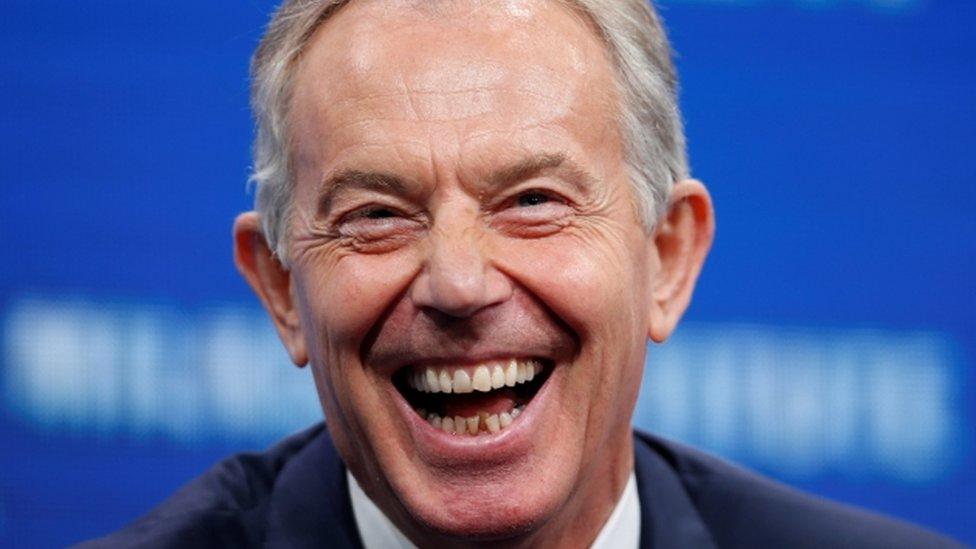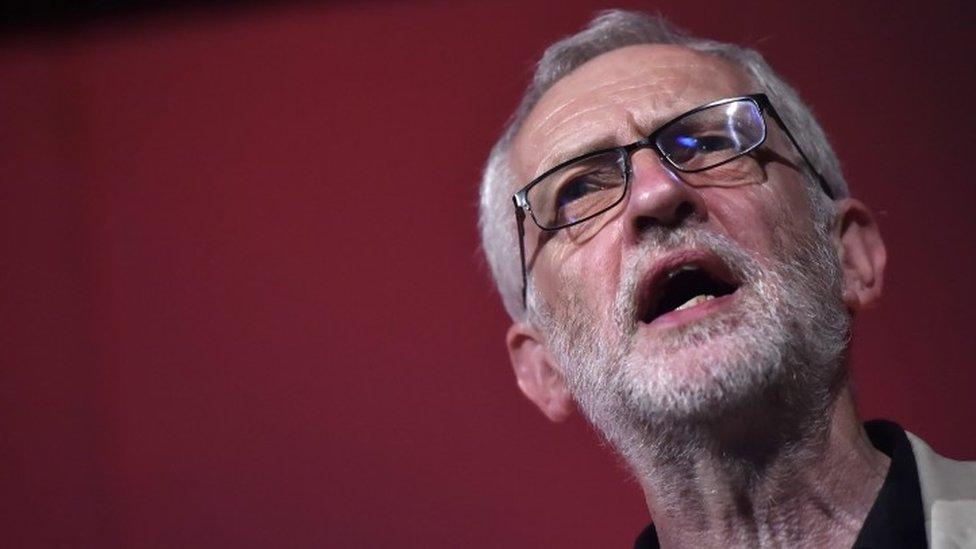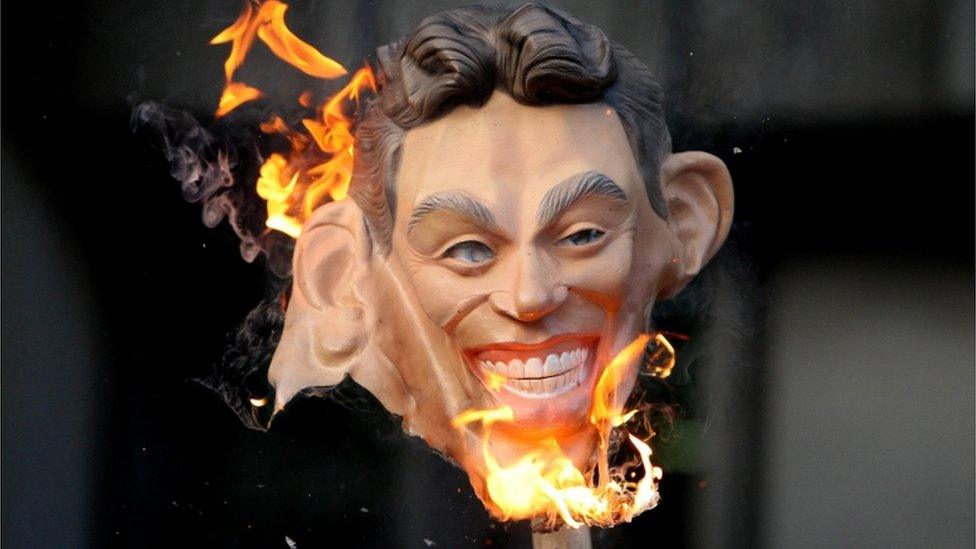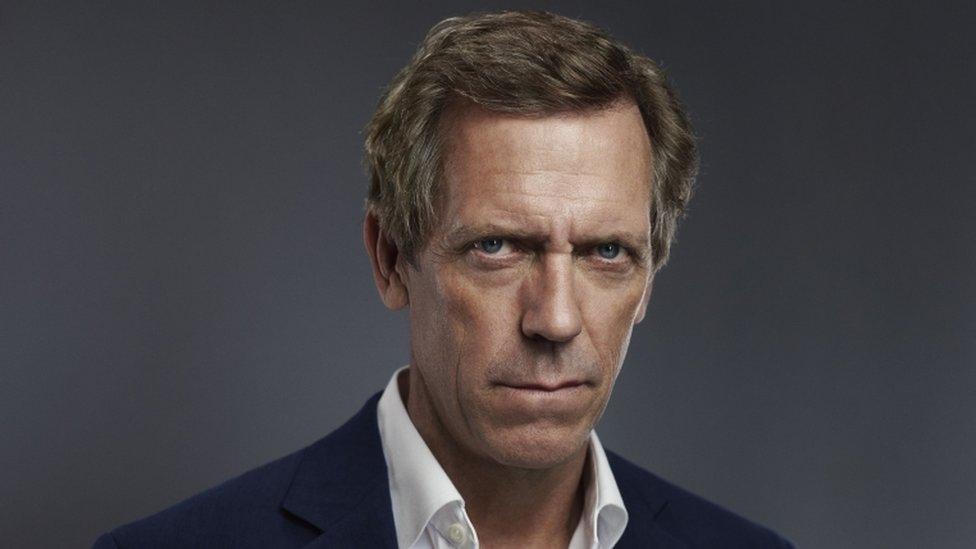Ghost of Blair continues to haunt Labour
- Published

Tony Blair: A jovial ghost?
Adam Lang, the fictional British Prime Minister in Robert Harris' novel The Ghost, external faces prosecution for war crimes in an international court.
Lang is not so much a thinly veiled portrait of Tony Blair as an explicitly, obviously exotic extension, with added warts and delusions, of our former prime minister.
Now, according to one Sunday newspaper, external, the Chilcot inquiry could, in reality, accuse Tony Bair of such crimes.
The added spice is that while Lang merely faced his former foreign secretary, current Labour leader Jeremy Corbyn would apparently back Blair's prosecution, external at the Hague.
No novelist would be quite so obvious as to cast his revenging fury as a current party leader, the very embodiment of all his victim had exiled from mainstream politics. The Ghost indeed.
The Labour Party is still haunted by the manifest success and equally spectacular failure of Tony Blair.
Mr Blair has just suggested that simple lessons should be learnt, external about genies and bottles, saying: "We underestimated profoundly the forces that were at work in the region and that would take advantage of the change once you topple the regime."
Chilcot may not be as dramatic as the weekend headlines suggest, but it is still very far from ancient history.
What is the Chilcot inquiry into the Iraq war for?
Iraq Inquiry: Timeline of key moments
The legacy of the Iraq War is a critical part of the vital, current debate within the Labour party.
Still, Mr Blair looms too large for his erstwhile supporters to either praise him or bury him.
Crucially, the road to Baghdad was paved with political ambitions for his party.
One was dealing with the outsized fear, after 9/11, of enemies getting hold of weapons of mass destruction (WMD).
The mingling of realistic fears, the actual facts and convenient fantasy is what Chilcot has to disentangle, and there will be plenty of time to chew over the findings.
Appetite for intervention
What may get lost is the wider context of Mr Blair's enthusiasm for action.
Central to Mr Blair's transformation of the Labour Party was killing off negative perceptions that the party was "too left wing" for power.

Jeremy Corbyn was an opponent of the Iraq War
He didn't bother to dispute the accusations of a hostile press and the worries of swing voters - instead his technique was to flamboyantly adopt policies that spoke loudly of their opposite, external.
In one area, he saw a double lock on Labour's door to power - the claims it was:
soft on defence, external in general
unenthusiastic about an alliance with the US in particular
Both had deep roots, from the pacifism of party leader George Lansbury, external in the 1930s to protests over Vietnam, external in the 1960s.
But more important was CND in the 1980s and a view of the world that saw the US not as a valiant bulwark in a Cold War against tyranny, but the inheritor of an Western imperial legacy, external, giving succour to dictators and oppressors who made the world safe to sell Coca-Cola.
Jeremy Corbyn was firmly, prominently, consistently one of those who saw the ills of the world through the lens of American imperial power, external.

Tony Blair's decision to intervene in Iraq sparked vitriolic protest
Mr Blair thought the world needed that power, almost irrespective of its actual actions.
Curious as it seems in retrospect, he feared that George W Bush (pre-9/11) would disengage the US from the world.
An enthusiastic "liberal interventionist", external, as set out in his Chicago speech, external, Tony Blair realised the US was an essential part of his vision of a West that righted wrongs with enthusiasm and military power.
As he has made clear since, he didn't just go along with President Bush, external.
"It's worse than you think," he said. "I believe in it. I am truly committed to dealing with this, irrespective of the position of America.
"If the Americans were not doing this, I would be pressing for them to be doing so."
He is still at it, urging a new ground war in Syria and Iraq, involving the UK, US and France.

Tony Blair:
Born: 6 May 1953
Educated: Choristers school, Fettes, Oxford
Family: Married, four children
1976: Barrister specialising in trade union and employment law
1983: Labour MP for Sedgefield, shadow City spokesman
1984-87: Shadow trade and industry minister
1987-88: Shadow energy secretary
1989-92: Shadow employment secretary
1992-94: Shadow home secretary
1994-97: Opposition leader
1997-2007: Prime minister, winning three successive general elections
2007-2015: Envoy of the Quartet on the Middle East
2008: Launched the Tony Blair Faith Foundation

After Mr Blair, after Iraq Labour supporters could bitterly, wryly, reflect that their party had put to bed forever the idea that it was weak on defence, such was his enthusiasm for offensive action.
Except that is no longer true. We are witnessing the same old debates, the same old questions, about Trident, about Nato, about military spending.
And perhaps that is appropriate. But it is not very helpful for the Labour party itself to be squabbling in the past tense.
On the eve of the Iraq War, I reflected that we were sailing into uncharted waters - a British prime minister taking a country into a war, that as far as one can tell, the population didn't want.
A war against the will of the people. It could have turned out differently, perhaps. But no WMD, external were found, and the occupation was both occasionally brutal and usually incompetent.
New Labour staggered on, but those who had always mistrusted Mr Blair found a fitting locus for their dislike.
Party members and voters peeled off, so slowly, but so certainly.
His behaviour out of office has made him even more of a hate figure for some on the left.
Although he is the ghost who haunts the party's halls, he is a very bouncy, upbeat, jet-setting sort of spirit - defiantly unapologetic, made extravagantly rich in part, some say, by consorting with questionable regimes, external.

Richard Roper: A touch of the Tony Blair?
I can't be the only one who sees something of Mr Blair in Hugh Laurie's brilliant portrayal of Richard Roper, external in the Night Manager - not that anyone's suggesting Mr Blair is a corrupt arms dealer, its just there's something familiar about his breezy, easy way with power, wealth and entourage.
Wherever Mr Corbyn's subsequent career takes him, it is impossible to imagine him following these footsteps.
It is only one of the myriad ways in which he is the austere anti-Blair.
Not, however, Mr Blair's exorcist, but his primal antithesis, all the tribe's most atavistic instincts reanimated, all that Mr Blair buried, resurrected.
He will not lay the family ghost.
The leadership may despise Mr Blair's techniques for winning power - but they haven't yet found their own.
Part of Mr Blair's skill was in the much-mocked art of triangulation, rising above left and right, to hover somewhere not only midway between the two, but with a certain degree of moral altitude above both.
No-one in the Labour party has yet attempted this between Mr Blair and Mr Corbyn. It is perhaps too soon. But the world does not wait.
The lessons drawn from Iraq by a former senior civil servant may be clear by the late summer, but the foreign policy debate generally grows ever more complex.
It is too early for Labour to deal with its devils, but it will probably means it will be stuck in a black-and-white debate in an increasingly multi-hued world.